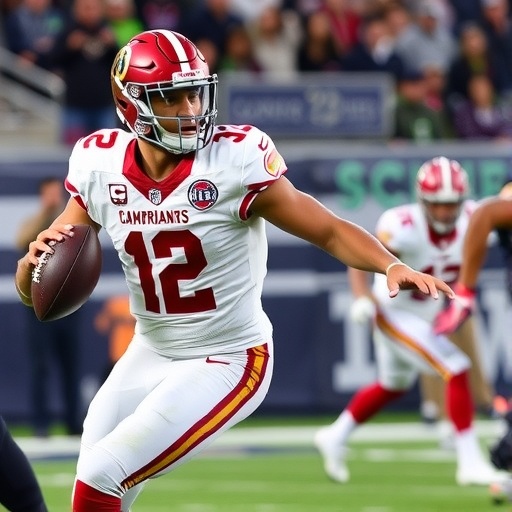In a devastating blow to the Washington Commanders‘ season, the team fell 38-14 to the Seattle Seahawks on Sunday at FedExField, with rookie sensation Jayden Daniels sidelined by a concerning arm injury that left fans and analysts reeling. The NFL matchup, which started with promise for the Commanders, quickly unraveled into a one-sided affair dominated by Seattle’s explosive offense.
Daniels, the No. 2 overall pick in this year’s draft, had been the spark igniting Washington’s turnaround under new head coach Dan Quinn. But in the second quarter, after completing 12 of 18 passes for 145 yards and a touchdown, the young quarterback took a brutal hit from Seahawks linebacker Boye Mafe following a scramble. He clutched his throwing arm, writhing in pain as medical staff rushed the field. The injury, later diagnosed as a possible ligament tear in his elbow, forced Daniels out for the remainder of the game and potentially much more.
“It’s a tough one, no doubt,” Quinn said post-game, his voice heavy with concern. “Jayden’s our leader out there. Losing him like this… we’re going to rally around him and each other.” The loss drops the Commanders to 4-3, while the Seahawks improve to 5-2, solidifying their position in the NFC West.
Daniels’ Early Magic Fades into Heartbreaking Exit
The game kicked off with Jayden Daniels looking every bit the franchise quarterback Washington had hoped for. On the Commanders‘ opening drive, he orchestrated a 75-yard march, capping it with a 22-yard strike to wide receiver Terry McLaurin. The crowd erupted, sensing a statement win against a playoff-contending Seahawks squad. Daniels’ mobility was on full display; he evaded sacks twice and even gained 28 rushing yards on designed keepers, showcasing the dual-threat ability that made him a Heisman winner at LSU.
Statistics from the first quarter painted a rosy picture: Daniels boasted a 132.4 passer rating, completing 8 of 10 attempts with no interceptions. The NFL world buzzed on social media, with analysts like ESPN’s Dan Orlovsky tweeting, “Daniels is playing like a vet already. Commanders could be dangerous if he stays healthy.” But health became the operative word all too soon.
In the second quarter, with Washington leading 7-3, Daniels dropped back on third-and-8. Spotting a seam in the defense, he rolled out to his right, but Mafe, who leads the Seahawks with 4.5 sacks this season, closed in fast. The blindside hit twisted Daniels’ arm awkwardly against his body, eliciting gasps from the 65,000-plus in attendance. He stayed down for several minutes, his helmet off as trainers assessed the damage. X-rays at halftime confirmed no fracture, but an MRI scheduled for Monday will determine the extent of the soft-tissue injury.
Backup Marcus Mariota entered the fray, but the momentum had shifted. Mariota, a former first-rounder himself, managed only 112 passing yards and an interception before halftime, underscoring the void left by Daniels. Fans chanted “Jaay-den! Jaay-den!” as he walked gingerly to the locker room, a poignant reminder of the NFL‘s unforgiving nature for young stars.
Seahawks’ Offensive Firepower Overwhelms Commanders’ Secondary
While Daniels’ injury stole headlines, the Seahawks‘ dominance was methodical and relentless. Led by veteran quarterback Geno Smith, Seattle exploded for 28 second-half points, exploiting every mismatch against a Commanders defense that entered the game ranked 18th in points allowed. Smith’s performance was vintage: 28 of 35 for 312 yards, three touchdowns, and zero picks, earning him a perfect 158.3 passer rating.
Wide receiver DK Metcalf was the beneficiary, hauling in 7 catches for 132 yards and two scores, including a 45-yard bomb that sailed over cornerback Benjamin St-Juste. “We came in focused,” Metcalf said in the post-game presser. “Their secondary is young, and we targeted that. Geno’s reads were spot-on.” Running back Kenneth Walker III added 112 yards on 18 carries with a touchdown, as the Seahawks controlled the clock for 34:22.
The Commanders‘ defense, coordinated by Joe Whitt Jr., struggled with assignments. They allowed 452 total yards, their worst output since Week 1. Linebacker Frankie Luvu led the tackle sheet with 11 stops, but the unit surrendered big plays on 42% of Seattle’s drives. Quinn later admitted, “We didn’t execute in the run fits, and that opened up the pass. Credit to Seattle—they’re a top-tier offense right now.”
Historically, this matchup has been lopsided; Seattle now leads the all-time series 8-4, including a playoff win in 2005. But Sunday’s 24-point margin was the largest since 2012, highlighting how far the Commanders still have to go despite their 3-1 start.
Washington’s Ground Game Stalls Amid Chaos
Beyond the aerial assault, the Commanders‘ running game, a cornerstone of their identity, sputtered against Seattle’s stout front seven. Brian Robinson Jr., who had rushed for over 100 yards in three straight games, was held to 62 yards on 15 carries. The Seahawks defense, anchored by tackles like Jarran Reed and Leonard Williams, stuffed the line of scrimmage, limiting Washington to 3.8 yards per carry.
A key moment came in the third quarter when Robinson fumbled on a third-and-2, leading to a short field that Seattle converted into a touchdown. “We pride ourselves on ball security,” Robinson reflected. “That turnover killed us. Can’t let it happen against a team like this.” The NFL fumble stat line showed Washington coughing up two on the day, both returned for Seattle advantages.
Offensive line woes compounded the issue. Left tackle Charles Cross was flagged twice for holding, disrupting rhythm. Daniels’ mobility had masked these deficiencies earlier in the season, but without him, the Commanders managed just 89 rushing yards total. Analysts point to this as a red flag: Washington’s offense ranks 12th in rushing efficiency league-wide, but against top-10 run defenses like Seattle’s, it faltered.
In the locker room, veteran guard Brandon Scherff emphasized resilience: “Injuries happen in this league, but we adapt. Mariota stepped up, and we’ve got depth. Next week, we bounce back.” Yet, the numbers tell a sobering tale—teams losing their starting QB mid-season win only 35% of remaining games, per NFL historical data from the last decade.
Broader Implications: Daniels’ Injury Clouds Commanders’ NFC East Push
As the Commanders lick their wounds, the ripple effects of Jayden Daniels‘ injury extend far beyond this loss to the Seahawks. Washington sits one game behind the Philadelphia Eagles in the NFC East, but without their dynamic rookie, projections dim. Vegas oddsmakers shifted the Commanders‘ Super Bowl odds from +2500 to +5000 overnight, reflecting the uncertainty.
Medical experts, speaking anonymously to NFL Network, suggest Daniels could miss 4-6 weeks with a ligament sprain, though surgery isn’t ruled out. This timeline overlaps critical games against the Giants, Steelers, and Eagles—matchups that could define their wildcard hopes. Mariota’s experience (72 starts over nine seasons) provides a safety net, but his 2023 completion percentage hovered at 62%, far below Daniels’ 68%.
Fan reaction poured in via social media, with #PrayForDaniels trending nationwide. One supporter tweeted, “From Heisman glory to this? Heartbreaking. Commanders nation behind you, JD.” Ownership, led by Josh Harris, issued a statement: “Our priority is Jayden’s health. We’ll support him every step.”
Looking ahead, the NFL trade deadline looms on November 5. Whispers suggest Washington might pursue a veteran QB like Russell Wilson if Daniels’ rehab stalls. Meanwhile, the Seahawks, riding high, face the Rams next—a divisional clash that could cement their contender status.
For the Commanders, this defeat serves as a gut check. Their defense must tighten, the run game revive, and the team unite in Daniels’ absence. As Quinn put it, “Adversity builds champions. We’ll see what we’re made of.” The coming weeks will test that resolve, with playoff aspirations hanging in the balance amid the shadow of this pivotal injury.
In the broader NFL landscape, Daniels’ setback underscores the perils of rookie QBs in high-stakes environments. Since 2018, 12 first-year signal-callers have suffered season-altering injuries, derailing promising campaigns. Washington’s medical staff, bolstered by new hires this offseason, now faces its sternest challenge yet.
Statistically, teams with backup QBs post-injury see a 22% drop in offensive EPA (expected points added), per Next Gen Stats. For Washington, ranked 14th in offensive DVOA entering the game, this could plummet them to mediocrity. Yet, optimism lingers: Daniels’ leadership off-field, combined with Quinn’s defensive expertise, might sustain them.
The Seahawks‘ win, conversely, boosts their profile. With Smith under contract through 2025, Seattle eyes a deep playoff run. Metcalf’s post-game comments hinted at bigger goals: “We’re built for January. This was just a tune-up.”
As Monday’s MRI results trickle in, Commanders fans hold their breath. A short-term injury keeps hope alive; a longer one could redefine the season. Either way, Daniels’ emergence—and now his vulnerability—has captivated the NFL world, turning this game into a narrative of triumph and trial.








